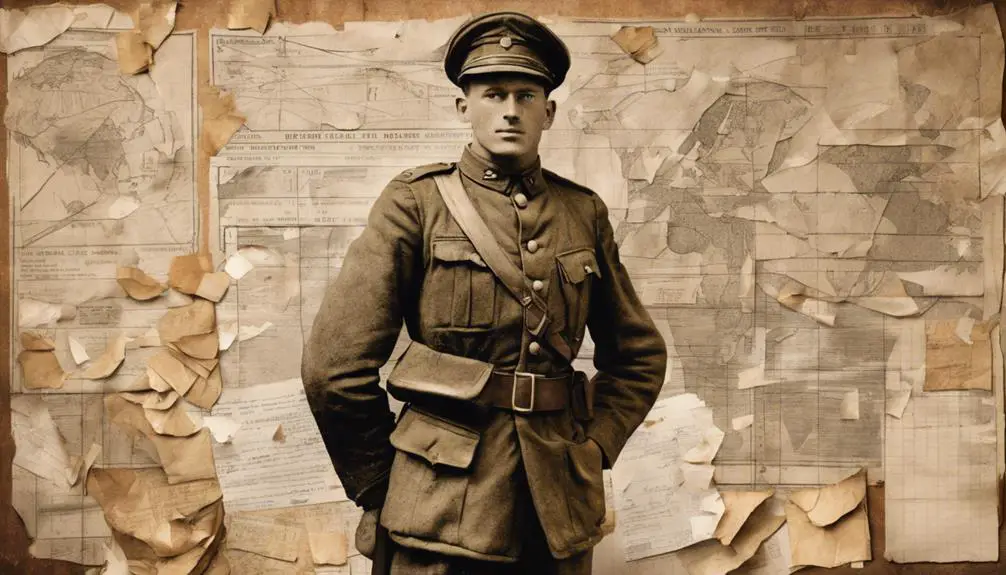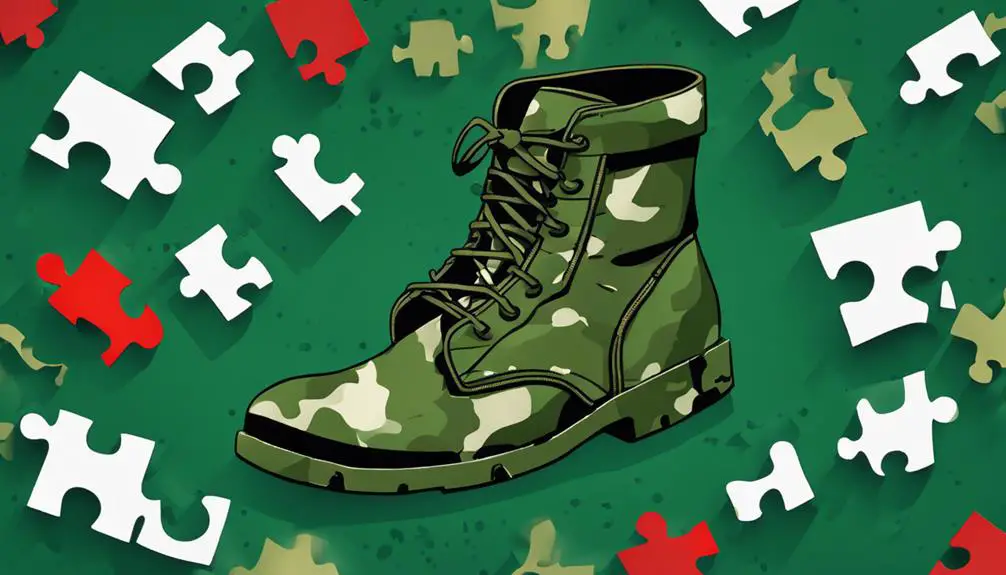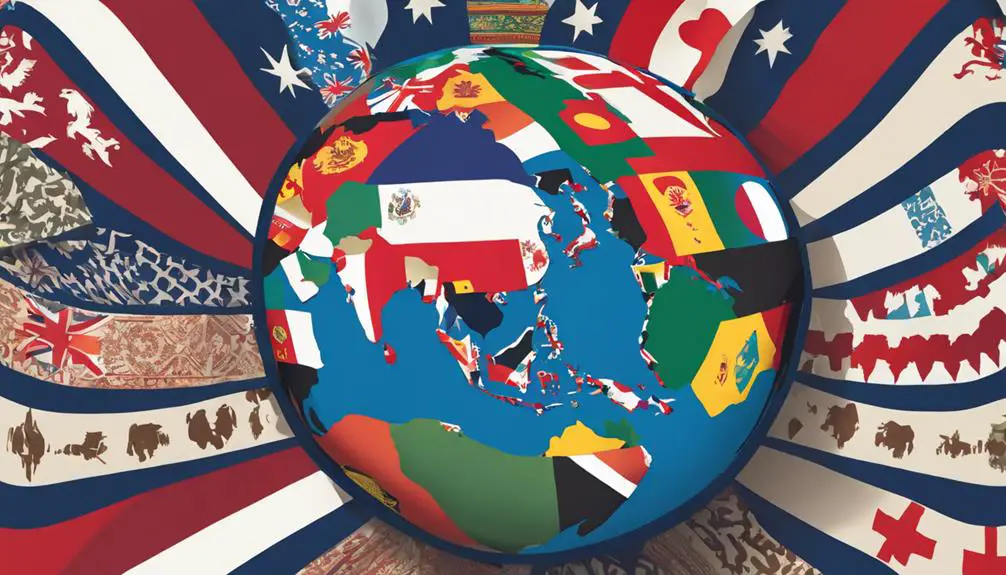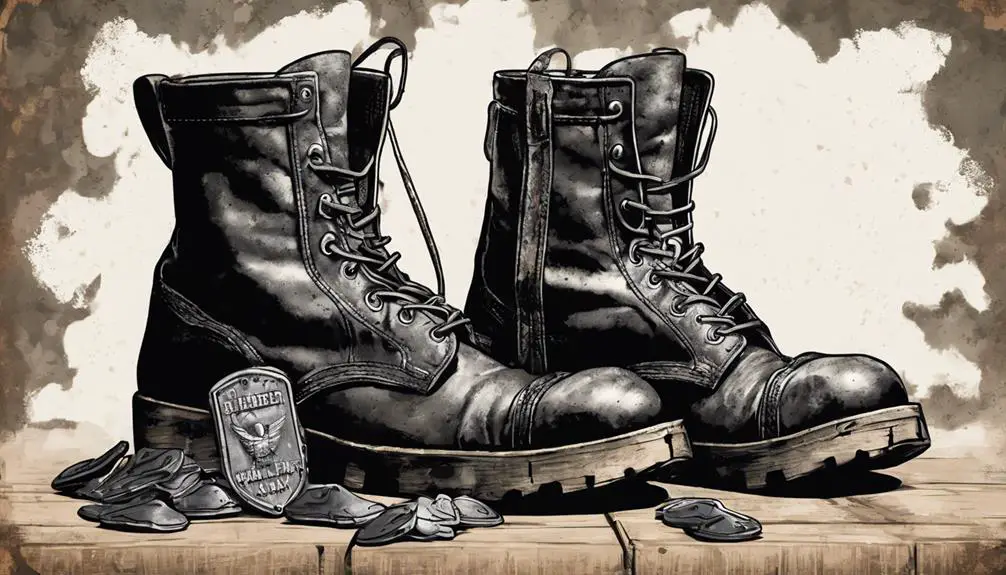You're about to explore the fascinating world of boot slang, a language born out of wartime necessity. Soldiers developed unique vocabulary, abbreviations, and colloquialisms to communicate swiftly and securely. On the battlefield, slang terms like 'sitrep' and 'FUBAR' facilitate quick communication, while boosting morale and camaraderie. Deciphering military acronyms is essential, and colorful expressions and insults serve various purposes in military culture. As you venture deeper, you'll discover global variations of boot slang, shaped by cultural adaptations and linguistic evolution. You'll uncover more about the evolution of military communication and the role of boot slang in it.
Origins of Military Jargon

You've likely wondered how military slang originated, and the answer lies in the early days of warfare, when soldiers needed a secret language to communicate quickly and efficiently on the battlefield. This linguistic phenomenon has its roots in the early days of warfare, where soldiers relied on cryptic language to convey important information without alerting the enemy. The historical context of military slang is deeply rooted in the need for secrecy and swiftness.
In the heat of battle, soldiers couldn't afford to waste time or risk being overheard. They developed a unique vocabulary, comprising abbreviations, acronyms, and colloquialisms that only they could understand. This secret language allowed them to convey complex information rapidly, often using metaphors, allusions, and wordplay to conceal their messages.
The linguistic roots of military slang are a reflection of the ingenuity and resourcefulness of soldiers, who, in the face of adversity, created a language that was both functional and cryptic. As you explore further into the world of military slang, it becomes clear that its origins are deeply tied to the historical context in which it emerged.
Slang of the Battlefield
On the frontlines, soldiers rely on a specific vocabulary of slang to convey important information swiftly and securely, often using terms like 'sitrep' for situation report and 'FUBAR' to describe a chaotic situation. This unique language helps facilitate quick communication and reinforces combat camaraderie among troops. You'll often hear soldiers engaging in battlefield banter, using colloquialisms to lighten the mood and boost morale.
Here's a breakdown of common battlefield slang:
| Term | Meaning | Example
| — | — | —
| Sitrep | Situation Report | "Give me a sitrep, what's the current situation?"
| FUBAR | Fouled Up Beyond All Recognition | "This op has gone FUBAR, let's regroup."
| Oscar Mike | On the Move | "Oscar Mike, we need to get moving ASAP."
| H-Hour | Hour of Attack | "H-Hour is 0600, be ready to move out."
Decoding Military Acronyms

As you explore the world of military communication, deciphering acronyms becomes essential to understanding operational plans and procedures. You'll soon realize that military personnel rely heavily on acronyms to convey complex information quickly and efficiently.
However, this can lead to Acronym Overload, where the sheer volume of abbreviations can be overwhelming. To avoid this, it's important to develop your Codebreaker Chronicles, a mental or physical repository of commonly used acronyms.
Start by familiarizing yourself with common military acronyms, such as 'SITREP' (Situation Report) or 'COMMS' (Communications). As you encounter new acronyms, add them to your Codebreaker Chronicles.
You'll find that understanding these abbreviations will enhance your comprehension of military communications. Remember, decoding military acronyms is an ongoing process that requires patience and practice.
Colorful Expressions and Insults
Explore the world of military slang, and you'll encounter a colorful array of expressions and insults that can be both entertaining and perplexing. As you investigate further, you'll discover that these phrases serve a purpose beyond mere entertainment. They're often used to establish a sense of camaraderie, to intimidate, or to assert dominance.
In the military, Tough Talk is a staple of communication. It's not uncommon to hear Fighting Words exchanged between comrades, a way to build rapport and test each other's mettle. These expressions can be lighthearted, like 'grunt' for an infantryman, or more serious, like 'buddy fucker' for someone who's always getting out of duty. Insults can be creative, like 'butterbar' for a second lieutenant, or brutal, like 'FNG' for a newbie.
While these expressions might seem frivolous, they play an important role in military culture. They help establish a sense of belonging, create a shared identity, and even serve as a coping mechanism for the stresses of combat.
Global Variations of Boot Slang

You'll find that military slang, with its unique flavor and function, isn't exclusive to one culture or country, as variations of boot slang emerge in different parts of the world. As you explore the global landscape of boot slang, you'll notice cultural adaptations that reflect local nuances and linguistic evolution.
For instance, in the Australian military, 'chuck a sickie' means to call in sick without being ill, while in the UK, 'squaddie' refers to a soldier. In the US, 'hooah' is a term used to express excitement or agreement, whereas in Canada, 'two-four' refers to a case of beer. These variations demonstrate how boot slang adapts to local contexts, incorporating regional dialects, idioms, and cultural references.
As you investigate global variations, you'll discover that linguistic evolution is shaped by cultural exchange, historical events, and social norms. The diversity of boot slang highlights the dynamic nature of language, as it evolves to reflect the unique experiences and environments of military personnel worldwide.
Evolution of Military Communication
Throughout history, military communication has undergone significant transformations, driven by technological advancements, strategic shifts, and the need for efficient information exchange in high-pressure environments. You're likely aware that effective communication is essential in military operations, where split-second decisions can mean the difference between success and failure.
As you explore the evolution of military communication, you'll notice a significant focus on Signal Security. This involves protecting communication channels from unauthorized access, ensuring that sensitive information remains confidential. You'll see that Signal Security measures have been consistently updated to counter emerging threats, such as encryption cracking and cyber attacks.
In addition, Radio Protocols have played a crucial role in shaping military communication. You'll find that standardized protocols have enabled seamless communication between units, allowing for coordinated efforts and swift responses. These protocols have been refined over time, incorporating advanced technologies like satellite communication and digital encryption.
As you investigate the evolution of military communication, you'll appreciate the intricate balance between security, efficiency, and innovation.
Frequently Asked Questions
Are Military Slang Words Used Only for Communication or Also for Bonding?
You might wonder whether slang words are used solely for communication or have a deeper purpose.
In reality, they serve a dual function. On one hand, they facilitate quick and efficient communication in high-stress situations.
On the other hand, they foster a sense of camaraderie and shared identity within a unit. By using unique phrases and terms, you're not only conveying information but also reinforcing your unit's identity and building a sense of belonging.
Can Military Slang Be Used in Formal Military Documents or Reports?
When writing official documents, do you really want to risk misinterpretation or confusion? Probably not. That's why you shouldn't use military slang in formal military documents or reports.
A formal tone demands an official language that guarantees document clarity and report accuracy. Using slang would compromise professionalism standards. Stick to standard language to maintain precision and avoid ambiguity, guaranteeing your message is conveyed effectively.
Are There Any Military Slang Words That Are Specific to Certain Ranks?
As you explore military slang, you'll notice that certain words and phrases are specific to particular ranks. This phenomenon is rooted in rank dialectics, where language adapts to the distinct cultural and functional nuances of each rank.
Officer lingo, for instance, often carries a more formal tone, whereas enlisted personnel may use more colloquial terms. You'll find that each rank has its unique linguistic identity, shaped by their distinct roles, responsibilities, and social dynamics within the military hierarchy.
Do Military Personnel Use Slang When Communicating With Civilians?
You're sitting in a coffee shop, chatting with a friend who's just returned from deployment. They're speaking in a language that's foreign to you, using words like 'OPSEC' and 'SITREP.' You're lost in the conversation, struggling to bridge the cultural gap.
In civilian interactions, military personnel often adapt their language to avoid cultural barriers. They tone down the slang, switching to a more neutral tone to guarantee effective communication.
It's a delicate balance between maintaining military identity and connecting with those outside the ranks.
Are Military Slang Words Ever Used to Intimidate or Instill Fear?
When you consider the use of slang in everyday interactions, you might wonder if certain words are employed to intimidate or instill fear. In some cases, the answer is yes.
Using specific terminology can create a fear factor, perpetuating power dynamics where the speaker holds dominance. This phenomenon transcends the military context, manifesting in various social hierarchies.
Conclusion
As you explore the world of military slang, it's like cracking a secret code. You start to understand the lingo, and suddenly, the obscure becomes clear.
Like the time a Navy SEAL whispered 'Oscar Mike' to his teammate, and they instantly sprang into action. It's a language born from necessity, forged in the heat of battle.
As you master this unique dialect, you'll uncover a rich cultural heritage hidden beneath the surface of military communication.







